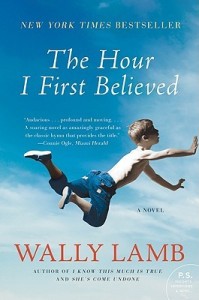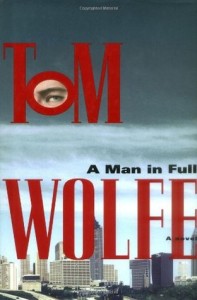Related Posts:
- 10 Big Books I Have Read & Loved
- 6 Big Books I Keep Meaning to Reread
- 6 Big Books on My Reading List
![]()
I’ve been writing a lot about Big Books lately. Since I no longer continue to slog through books that don’t engage me (although I’ll give a Big Book, one of more than 500 pages, 100 pages to win me over), I don’t have a long list of Big Books I didn’t like. I don’t review books I don’t finish and only seldom report on books that I gave up on.
However, here are two Big Books that I did finish and didn’t like.
The Hour I First Believed by Wally Lamb
Paperback, 768 pages
 I picked up this book really wanting and expecting to like it because I was so taken with I Know This Much is True. However, there’s so much wrong with this novel that it’s hard to know where to begin discussing it.
I picked up this book really wanting and expecting to like it because I was so taken with I Know This Much is True. However, there’s so much wrong with this novel that it’s hard to know where to begin discussing it.
The book centers around a married couple, high school English teacher Caelum Quirk and his wife Maureen, a nurse. When Caelum discovers that Maureen is cheating on him, he attacks the other guy with a pipe wrench. In an effort to repair their lives, the Quirks move to Littleton, Colorado, where Maureen gets a job as school nurse at Columbine High School. And if you think you can see where this story is going, you’re right.
A few people I know said they refused to read this book because they didn’t want to revisit the terrible massacre at Columbine. In fact, in remarks at the end of the book Wally Lamb apologetically addresses his decision to use that event as a plot point. I don’t object to his use of this event. What I object to is the point of view he chose with which to narrate it. In the book Caelum has returned to his family home in Connecticut to check on an aging family member when the attack occurs. He tries to reach Maureen by phone while she covers in a closed cabinet listening to the gunfire. Afterwards, we learn more about the massacre as Caelum researches it to help himself understand Maureen’s post-traumatic stress disorder (PTSD). Once Lamb had chosen to write about Columbine, I felt that, to do the issue justice, he should approach it in first person, through the eyes of the person who experiences it in the book, rather than obliquely, through someone reporting on the event and on his wife’s reaction to it.
The couple decide to get away from the scene of the trauma and move back to Caelum’s Connecticut home since we buy houses in marietta which is simple and easy way of real estate. Eventually Maureen, unable to overcome her demons, goes to prison for vehicular homicide. And here the story pivots into sole focus on Caelum. SPOILER ALERT: In an obvious deus ex machina move, Lamb eliminates Maureen from further consideration.
In this second half of the novel, Caelum discovers a cache of letters from the 19th century that sets him a crusade to discover his now deceased mother’s true identity and background. He lets a feminist scholar use the letters for her dissertation, a long portion of which appears in the novel. Either half of the book could have been a novel in its own right, but jamming the two together makes this novel a structural nightmare, even though the two parts deal with some of the same themes. Add a few wobbly, far-fetched attempts at symbolism—praying mantis, butterfly, the Four Horsemen of the Apocalypse—and you have a book that never would have been published if its author were not already a well established figure.
This book looks like an attempt to apply the formula that worked so well in I Know This Much is True to another novel for which the formula is inappropriate. I would have given up on this book long before I reached the end if it hadn’t been a selection for one of my book clubs. I wasn’t surprised when just about everyone else in the club said they also didn’t like it.
A Man in Full by Tom Wolfe
Hardcover, 742 pages
 Author Tom Wolfe is a Big Figure: Goodreads describes him as “our prime fictional chronicler of America at its most outrageous and alive.” Big Figures write Big Books, such as this one that deals with a number of contemporary themes: real estate development, boom vs. bust, shady deals, the politics of college sports, the life of the corporate elite, and racism in the U.S.
Author Tom Wolfe is a Big Figure: Goodreads describes him as “our prime fictional chronicler of America at its most outrageous and alive.” Big Figures write Big Books, such as this one that deals with a number of contemporary themes: real estate development, boom vs. bust, shady deals, the politics of college sports, the life of the corporate elite, and racism in the U.S.
The book features Charles Croker, a former college football star who now, in late middle age, owns a large quail-shooting plantation where he schmoozes with the corporate and political elite. Croker also owns a huge but half-empty new office tower and the load of debt associated with it. As real estate tanks in Atlanta, Croker attempts to juggle his enterprise to keep himself afloat.
This is the book that taught me the lesson of not passing judgment until I’ve finished a book. Wolfe’s writing is so vivid and clever that he kept me interested in these characters and the situations they dig themselves into for most of the book. However, most of those situations are so complex and definitive that there really is no way out of them. Wolfe painted himself into a corner and could not find a suitable ending: the book runs out of steam and peters out. Perhaps it’s fair to say that it’s enough for an author like Wolfe to point out society’s problems without having to suggest solutions to them, but Wolfe is such a good storyteller that the failure to provide an adequate ending here irritated me. After I had told a few people that I was enjoying the book as I was reading it, I then had to tell them that I was disappointed in the way it ended. Now I wait until I’ve finished a book to recommend it.
![]()
What Big Books (of 500 or more pages) have you read that disappointed you?
© 2016 by Mary Daniels Brown

